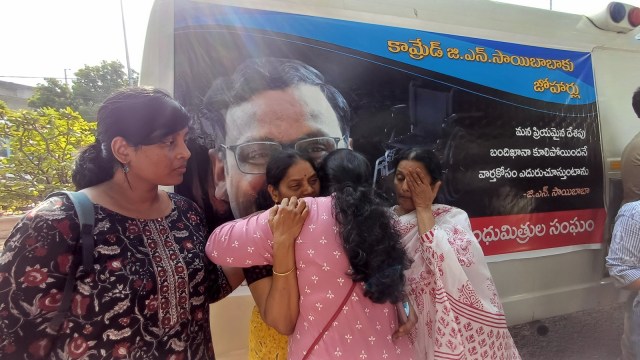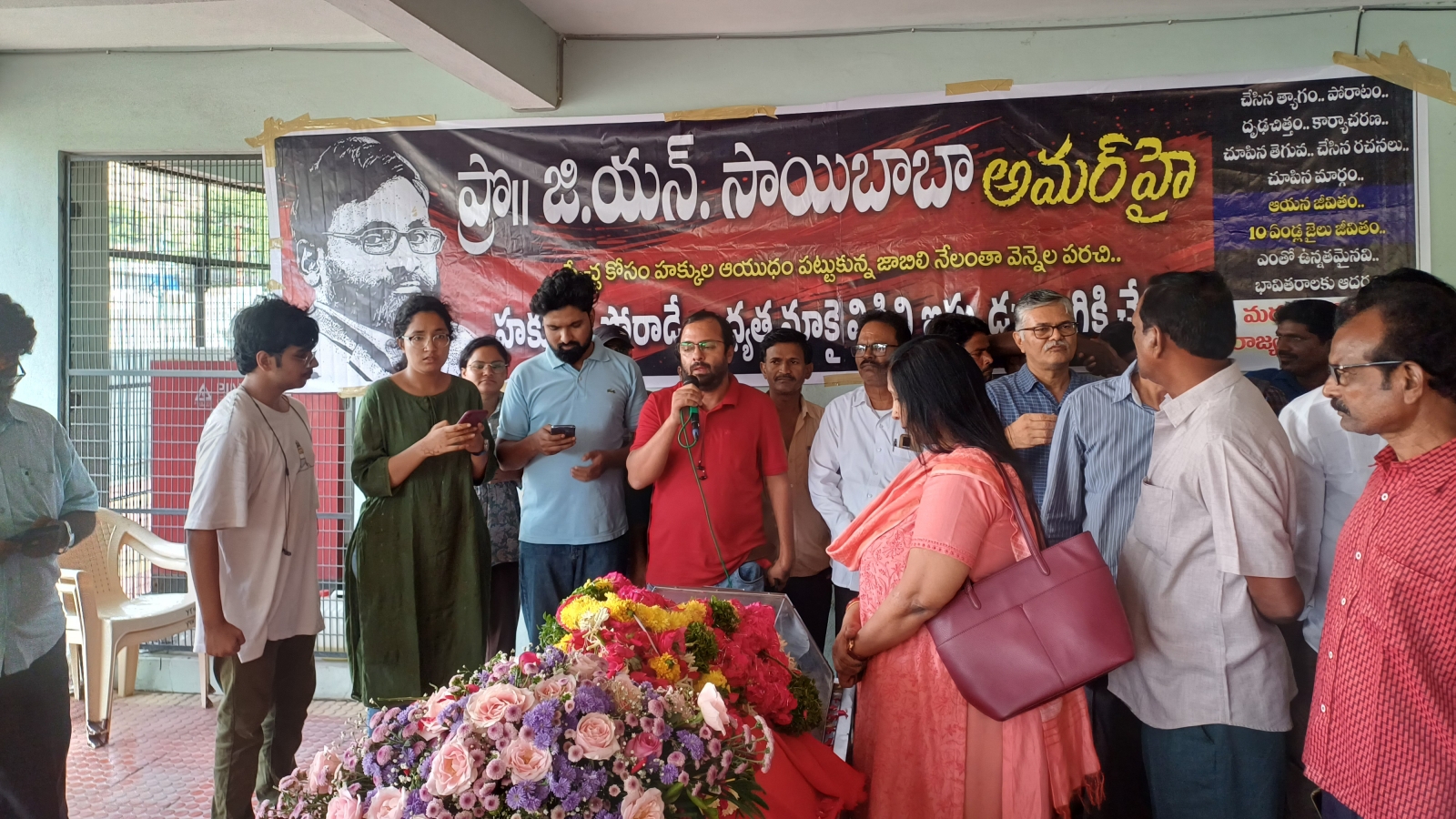Amid chants of “Fight against UAPA” and “Your sacrifices won’t be in vain”, the body of Dr G N Saibaba, the former Delhi University professor who died on Saturday after spending a decade in jail for alleged Maoist links before being released earlier this year, was handed over to Gandhi Medical College in Hyderabad on Monday.
“I’m waiting for the day to hear the news of the collapse of our beloved country’s prisons” is a loose translation of lines from a poem of his that was printed on a poster, which also featured a photo of a beaming Saibaba, that was attached to the hearse that carried his body.

Hundreds gathered to pay tribute at the medical college campus, where the body was donated for medical research as per his wishes. His eyes had already been donated to the LVP Eye Institute the day before.
Story continues below this ad
“It was always his wish (to donate the body). He was an atheist and never believed in any funerary rites. He would say that at a certain point in society, those rites had a place – to build a community. But now, the most important thing for a person is to contribute to society. His idea was always to donate his body,” said Saibaba’s daughter, Manjeera, standing beside her mother Vasantha.
 GN Saibaba’s body was kept at his brother’s residence in Moula Ali for his followers and supporters to offer their condolences. (Express Photo: Rahul Pisharody)
GN Saibaba’s body was kept at his brother’s residence in Moula Ali for his followers and supporters to offer their condolences. (Express Photo: Rahul Pisharody)
Earlier in the day, after his family received the body from the Nizam’s Institute of Medical Sciences, where he died, a large group of supporters gathered at the Gun Park memorial in the city to pay tribute to Saibaba. From there, the body was taken to the Moula Ali area on the outskirts of the city, where it was kept at his brother’s residence for people to pay their respects.
According to the family of Saibaba, who was released from prison in March 2024, it was clear from the last seven months that he spent with them that his organs had deteriorated during the decade he spent in prison.
Saibaba recently underwent gallbladder removal surgery, and died as a result of complications that arose in its aftermath.
Story continues below this ad
Saibaba’s brother Dr Gokarakonda Ramadevudu linked his death to his time in prison. “The hot summers and cold winters that Dr Saibaba spent in the notorious ‘anda cell’ of Nagpur central prisons and the lack of proper medical attention to him led to his untimely demise,” Ramadevudu said.
He recalled his brother as someone who faced great challenges from childhood, after contracting polio, and overcame them to excel academically. “Unable to afford a wheelchair, he would crawl on the ground, using his slippers for support, to get to school. When he got to class 5, his teachers were shocked because Saibaba already knew the lessons that were being taught. He was the topper in every grade and the district topper in class 10. He also topped BA English in Andhra University,” said Ramadevudu.
Saibaba graduated with an MA in English from the University of Hyderabad, got an MPhil from the English and Foreign Languages University, and then completed his PhD from Delhi University, where he later joined as a faculty member.
“He was a voracious reader and shaped his character and personality through literature. He was surrounded by a large circle of friends from various social movements,” said Ramadevudu, who teaches at a private engineering college.
Story continues below this ad
Hem Mishra, one of the five others accused in the case along with Saibaba, said every time he felt weak, it was Saibaba who inspired him to stay strong.
He spent a decade with Saibaba in Maharashtra prisons, and arrived in Hyderabad on Monday to pay his last respects. “We would take turns helping Saibaba with his daily needs. He could not do even simple tasks like getting water or going to the bathroom on his own. Therefore, he required constant assistance from two people who would provide him with medication, food, and personal care. Despite such challenges, the prison could not break his willpower,” Mishra said.
“He would say that one day we would walk out of prison,” Mishra recalled, adding, “Because we did nothing wrong. We raised our voices against injustice, for the rights of the people, for the rights of Adivasis, Dalits and all the oppressed in this country. We were, and are, fighting for a just cause.”
N Venugopal, a friend of the family and editor of Veekshanam magazine, said: “He was incarcerated for 10 years in a false case, and during that trial itself one tribal man who was a co-accused, Pandu Narote, died. After three years of Narote’s death, he was acquitted. So, his was a death sentence before acquittal, and Saibaba’s is a death sentence after acquittal.”
Story continues below this ad
Venugopal said that it was Saibaba’s brain that the state was worried about. “His brain was perfect. So that is dangerous to the state… This is exactly what was said about Antonio Gramsci in Italy in 1926. Fascist Mussolini’s prosecutor said the Italian state wanted this brain to stop functioning for 20 years. The same thing happened in the case of Saibaba,” Venugopal said.



 GN Saibaba’s body was kept at his brother’s residence in Moula Ali for his followers and supporters to offer their condolences. (Express Photo: Rahul Pisharody)
GN Saibaba’s body was kept at his brother’s residence in Moula Ali for his followers and supporters to offer their condolences. (Express Photo: Rahul Pisharody)





